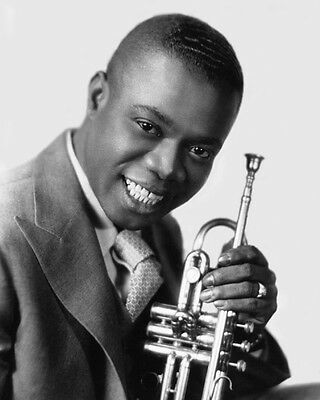Why Did Louis Armstrong Sound Like That?
As a private piano teacher I often introduce my students to new music that they haven't heard before. I like to introduce them to classical music and of course jazz. When I start playing them old Louis Armstrong recordings I find I get the same question over and over again, why did he sound like that? In this article I'm going to answer that question and many more, so get ready to learn a lot about Louis Armstrong!
Louis Armstrong's voice was first injured when he had a bad cold in 1921. He later had a series of surgeries to try to fix his voice in 1936 and 1937. Unfortunately the surgeries only made his voice more gravelly

All About Louis Armstrong
Louis Armstrong, also known as Satchmo or Pops, was an American jazz musician and singer from New Orleans, Louisiana. He was born on August 4, 1901 and died on July 6, 1971. Armstrong is considered one of the most influential figures in jazz music, and is known for his virtuosic trumpet playing, distinctive voice, and innovative improvisation.

Armstrong grew up in poverty in New Orleans, but began playing the trumpet at a young age. He quickly became a skilled musician and began performing in local bands. In 1922, he moved to Chicago to join King Oliver's Creole Jazz Band, where he gained national recognition for his musicianship.

In the 1920s and 1930s, Armstrong became one of the most popular jazz musicians in the United States. He recorded a number of hit songs, including "West End Blues," "Heebie Jeebies," and "What a Wonderful World." He also made a number of films and appeared on television, making him one of the most visible and popular jazz musicians of his time.
In addition to his musical career, Armstrong was also an important figure in the Civil Rights Movement. He was an advocate for racial equality and used his platform to speak out against racism and discrimination. He also refused to play in venues that discriminated against black patrons.
Armstrong's influence on jazz music and American culture is immeasurable. His innovative improvisation and virtuosic trumpet playing helped to establish jazz as a truly American art form. His distinctive vocal style, characterized by his gravelly voice and use of scat singing, also influenced countless singers and musicians.
Despite his success, Armstrong faced many challenges in his life. He struggled with poverty and racism early on, and later in life, he faced criticism from some jazz purists who felt that his commercial success had diluted the authenticity of his music.
Despite these challenges, Armstrong's legacy has endured. He remains one of the most beloved and respected musicians in American history, and his music continues to be celebrated and appreciated around the world. He was a member of the first class of inductees into the DownBeat Hall of Fame in 1971. His influence on jazz and popular music is still felt today, and he is often cited as a major influence by contemporary musicians in a wide range of genres.
Top 2 Recordings by Louis Armstrong
Here's a list of my personal favorite Louis Armstrong recordings, I hope you enjoy!
West End Blues
If you're a fan of jazz music, then you've definitely heard of Louis Armstrong and his iconic song "West End Blues." This classic tune has stood the test of time and continues to be a favorite among jazz enthusiasts.
As a blogger, I have to say that "West End Blues" is not just a song, it's a work of art. The opening trumpet solo alone is enough to give you goosebumps. Armstrong's virtuosic playing is on full display, as he effortlessly navigates the complex melody with ease. The song's structure is unique and it's one of the first recordings of a 12-bar blues form with an extended solo.
One of the things that makes "West End Blues" so special is the way it captures the energy and spirit of the time in which it was recorded. The song was recorded in 1928, in the midst of the Harlem Renaissance, a cultural movement that celebrated African American art and culture. The song's lyrics paint a vivid picture of the West End neighborhood of New Orleans, where Armstrong grew up, it adds a sense of nostalgia that takes you back to the era. If you want to learn more about music or take music lessons, you should check out our music lessons in Plymouth-Canton.
I also love the way Armstrong's voice and trumpet blend together in this song, it's like they were made to complement each other. His gravelly voice adds a sense of warmth and soul to the song, while his trumpet playing adds a sense of virtuosity and technical skill. Together, they create a truly unique sound that's hard to replicate.
Heebie Jeebies
As a jazz musician, I have to say that "Heebie Jeebies" by Louis Armstrong is one of the most iconic and influential songs of the genre. It was first recorded in 1926 by Louis Armstrong and his Hot Five and it quickly became a hit, cementing Armstrong's status as a jazz legend.
One of the things that makes "Heebie Jeebies" so unique is its playful and upbeat nature. The song's lyrics are full of clever wordplay and double entendres, and the upbeat tempo and lively trumpet playing make it the perfect song for dancing and having a good time. It's a perfect example of the New Orleans jazz sound, characterized by its syncopated rhythms and its emphasis on improvisation.
Another aspect that makes "Heebie Jeebies" stand out is the way it showcases Armstrong's vocal skills. His gravelly voice adds a sense of warmth and soul to the song, and his use of scat singing adds a level of spontaneity and playfulness to the song. The way he uses his voice to complement his trumpet playing is truly impressive and it's one of the reasons why this song is so memorable.
But "Heebie Jeebies" isn't just a catchy tune, it also has a historical significance. It was one of the first songs to use the word "jazz" in its lyrics, making it a pioneering song in the genre and helping to establish the term "jazz" as the standard name for the music. It also helped popularize the use of the word "scat" as a vocal improvisation technique.



